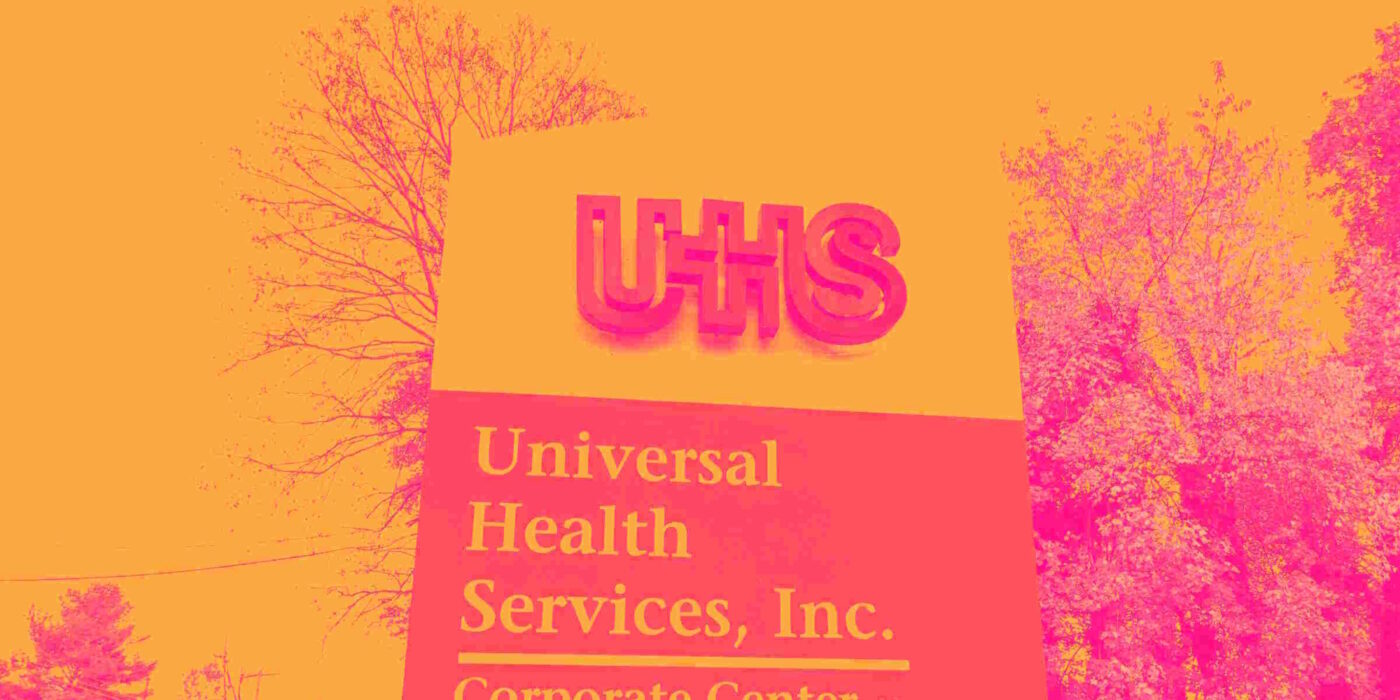
Hospital management company Universal Health Services (NYSE:UHS) reported Q2 CY2025 results topping the market’s revenue expectations, with sales up 9.6% year on year to $4.28 billion. The company expects the full year’s revenue to be around $17.2 billion, close to analysts’ estimates. Its non-GAAP profit of $5.35 per share was 8.4% above analysts’ consensus estimates.
Is now the time to buy Universal Health Services? Find out by accessing our full research report, it’s free.
Universal Health Services (UHS) Q2 CY2025 Highlights:
- Revenue: $4.28 billion vs analyst estimates of $4.24 billion (9.6% year-on-year growth, 1% beat)
- Adjusted EPS: $5.35 vs analyst estimates of $4.94 (8.4% beat)
- Adjusted EBITDA: $642.9 million vs analyst estimates of $619.4 million (15% margin, 3.8% beat)
- Adjusted EPS guidance for the full year is $20 at the midpoint, beating analyst estimates by 1.9%
- EBITDA guidance for the full year is $2.50 billion at the midpoint, above analyst estimates of $2.47 billion
- Operating Margin: 11.7%, in line with the same quarter last year
- Free Cash Flow Margin: 6.6%, down from 11.2% in the same quarter last year
- Same-Store Sales were flat year on year (3.4% in the same quarter last year)
- Market Capitalization: $10.03 billion
Company Overview
With a network spanning 39 states and three countries, Universal Health Services (NYSE:UHS) operates acute care hospitals and behavioral health facilities across the United States, United Kingdom, and Puerto Rico.
Revenue Growth
Reviewing a company’s long-term sales performance reveals insights into its quality. Any business can have short-term success, but a top-tier one grows for years. Thankfully, Universal Health Services’s 7.9% annualized revenue growth over the last five years was decent. Its growth was slightly above the average healthcare company and shows its offerings resonate with customers.
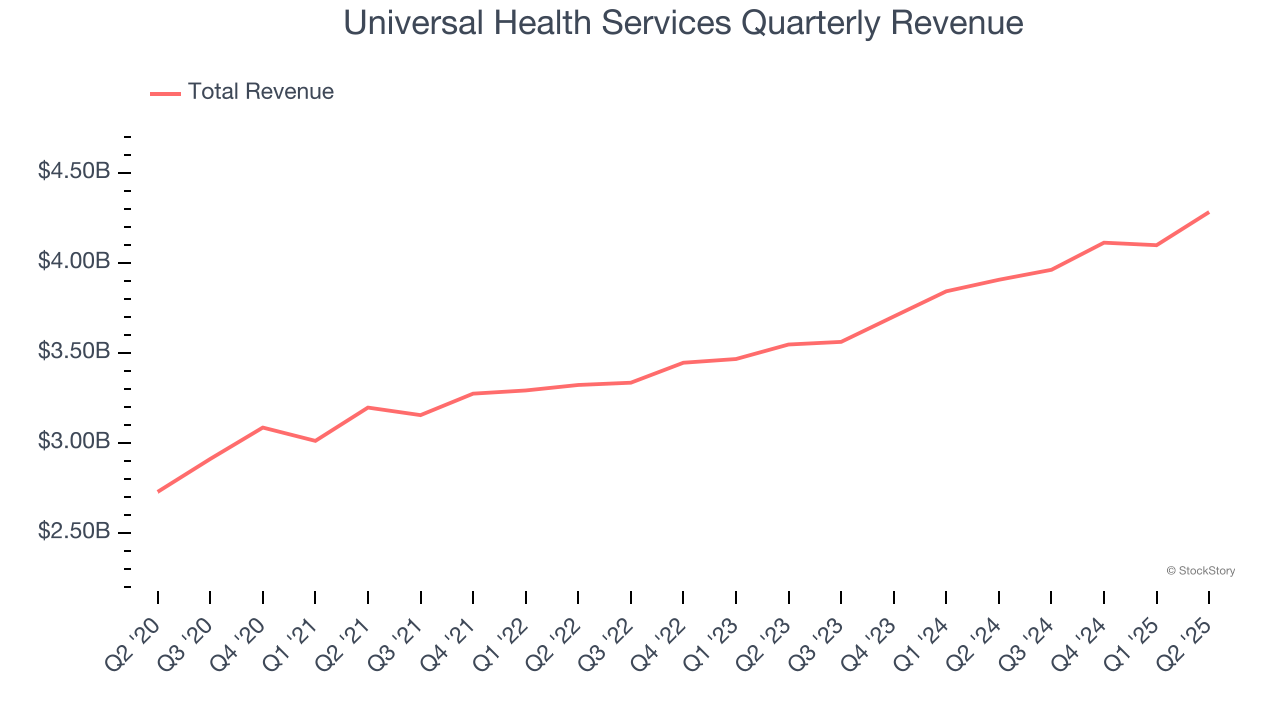
We at StockStory place the most emphasis on long-term growth, but within healthcare, a half-decade historical view may miss recent innovations or disruptive industry trends. Universal Health Services’s annualized revenue growth of 9.2% over the last two years is above its five-year trend, suggesting some bright spots. 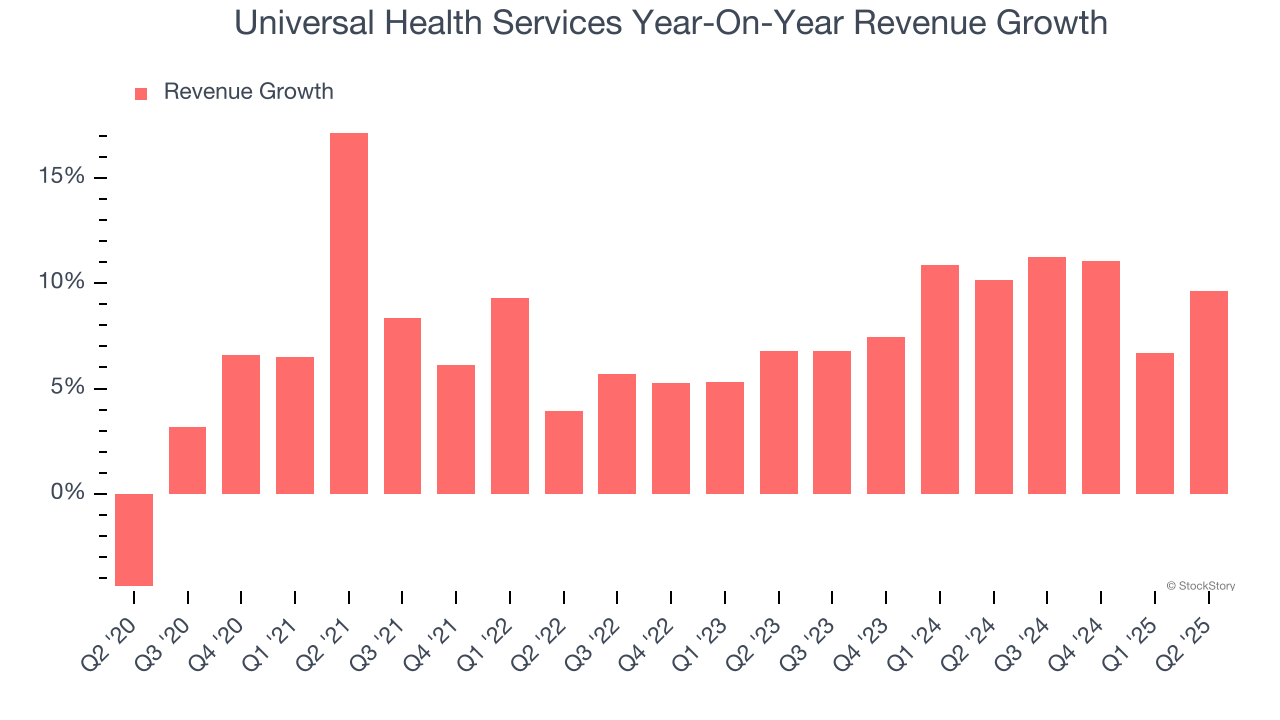
We can dig further into the company’s revenue dynamics by analyzing its same-store sales, which show how much revenue its established locations generate. Over the last two years, Universal Health Services’s same-store sales averaged 3.4% year-on-year growth. Because this number is lower than its revenue growth, we can see the opening of new locations is boosting the company’s top-line performance. 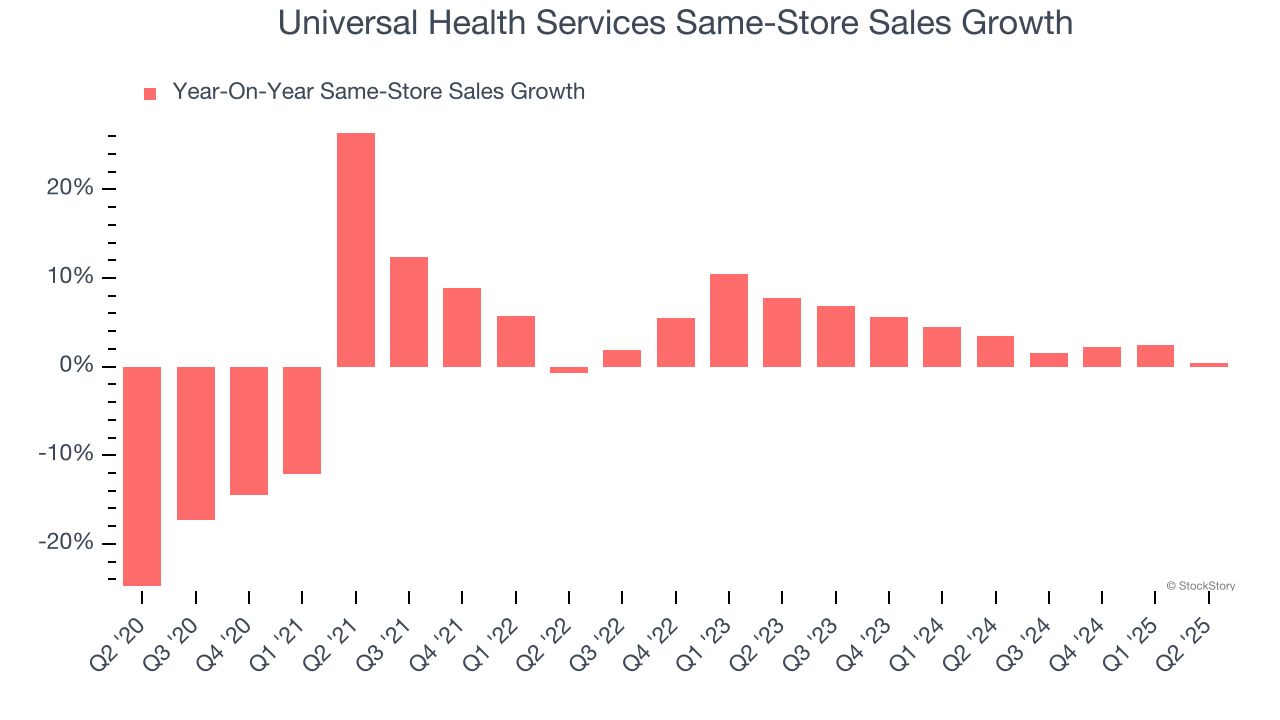
This quarter, Universal Health Services reported year-on-year revenue growth of 9.6%, and its $4.28 billion of revenue exceeded Wall Street’s estimates by 1%.
Looking ahead, sell-side analysts expect revenue to grow 6.8% over the next 12 months, a slight deceleration versus the last two years. We still think its growth trajectory is satisfactory given its scale and indicates the market is forecasting success for its products and services.
Software is eating the world and there is virtually no industry left that has been untouched by it. That drives increasing demand for tools helping software developers do their jobs, whether it be monitoring critical cloud infrastructure, integrating audio and video functionality, or ensuring smooth content streaming. Click here to access a free report on our 3 favorite stocks to play this generational megatrend.
Operating Margin
Universal Health Services was profitable over the last five years but held back by its large cost base. Its average operating margin of 9.8% was weak for a healthcare business.
Looking at the trend in its profitability, Universal Health Services’s operating margin decreased by 1.3 percentage points over the last five years, but it rose by 3.1 percentage points on a two-year basis. Still, shareholders will want to see Universal Health Services become more profitable in the future.
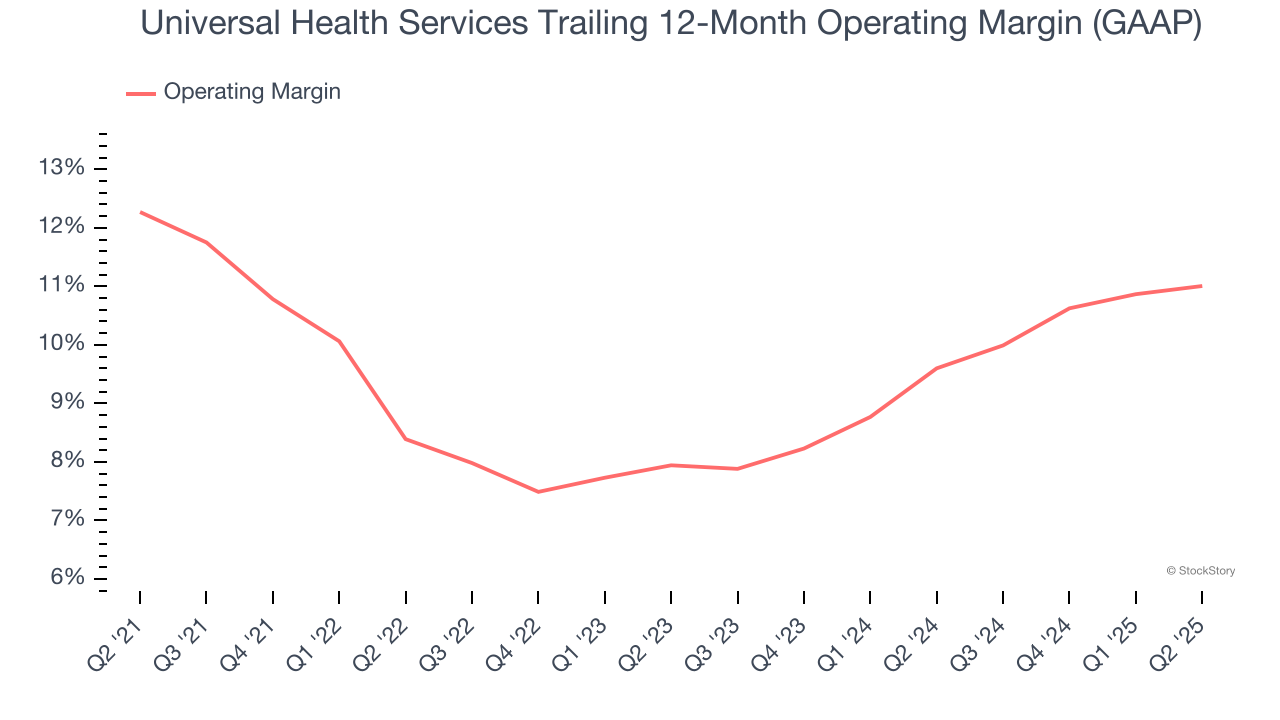
In Q2, Universal Health Services generated an operating margin profit margin of 11.7%, in line with the same quarter last year. This indicates the company’s overall cost structure has been relatively stable.
Earnings Per Share
Revenue trends explain a company’s historical growth, but the long-term change in earnings per share (EPS) points to the profitability of that growth – for example, a company could inflate its sales through excessive spending on advertising and promotions.
Universal Health Services’s EPS grew at a spectacular 14.7% compounded annual growth rate over the last five years, higher than its 7.9% annualized revenue growth. However, this alone doesn’t tell us much about its business quality because its operating margin didn’t improve.
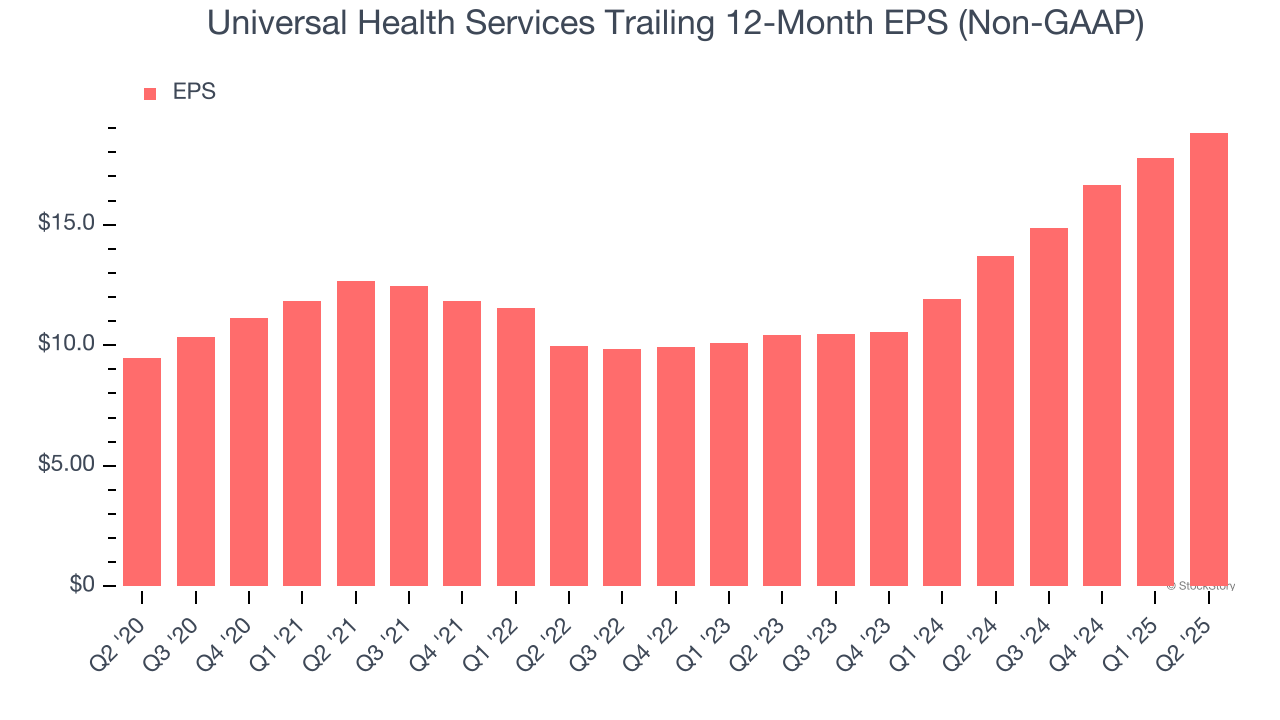
Diving into Universal Health Services’s quality of earnings can give us a better understanding of its performance. A five-year view shows that Universal Health Services has repurchased its stock, shrinking its share count by 23.6%. This tells us its EPS outperformed its revenue not because of increased operational efficiency but financial engineering, as buybacks boost per share earnings. 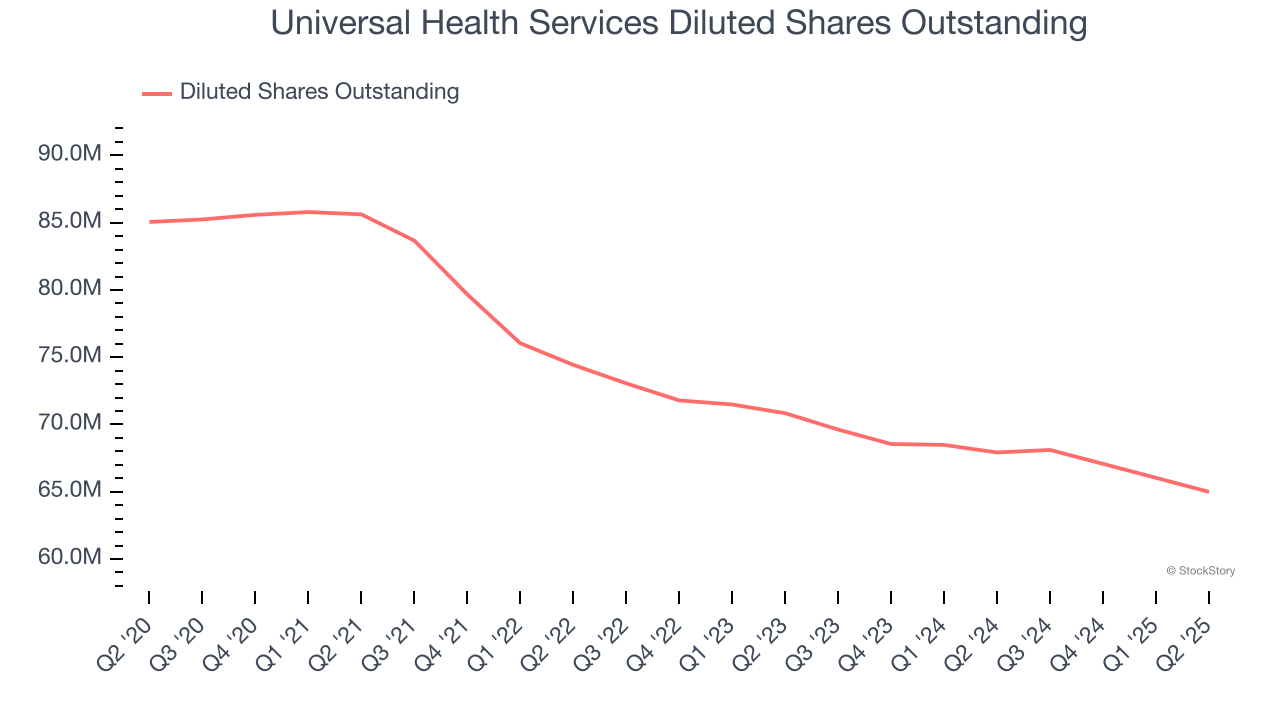
In Q2, Universal Health Services reported EPS at $5.35, up from $4.31 in the same quarter last year. This print beat analysts’ estimates by 8.4%. Over the next 12 months, Wall Street expects Universal Health Services’s full-year EPS of $18.82 to grow 8.1%.
Key Takeaways from Universal Health Services’s Q2 Results
It was encouraging to see Universal Health Services beat analysts’ full-year EPS and EBITDA guidance expectations. We were also happy its revenue, EPS, and EBITDA outperformed Wall Street’s estimates despite missing on same-store sales. Zooming out, we think this was a good quarter. The stock remained flat at $154.70 immediately after reporting.
Is Universal Health Services an attractive investment opportunity at the current price? What happened in the latest quarter matters, but not as much as longer-term business quality and valuation, when deciding whether to invest in this stock. We cover that in our actionable full research report which you can read here, it’s free.
